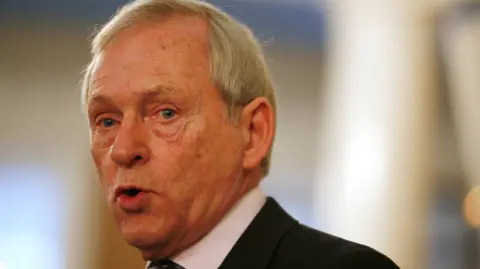Former Presiding Officer Sir George Reid Dies at 86
In a sorrowful moment for Scottish politics, Sir George Reid, the former presiding officer of the Scottish Parliament, passed away at the age of 86. His death marks the end of an era for many who admired him for his dedication to public service and his contributions to both domestic and international arenas.
George Reid was born in Tullibody, near Alloa in Clackmannanshire, in 1939, and his impact on Scottish public life is etched into the fabric of the nation’s history. Before becoming the presiding officer, Reid had already built a notable career as a television producer and journalist, portraying the stories that shaped Scotland for many years. He first entered politics as an MP when he was elected as the Scottish National Party (SNP) representative for Clackmannan and East Stirlingshire in 1974, a position he held until 1979. However, following his loss in the general election, Reid pivoted his career toward humanitarian work, dedicating 12 years to the International Red Cross and Red Crescent, where he contributed significantly to humanitarian efforts across the globe.
In 1999, Reid returned to the political scene, this time as a Member of the Scottish Parliament (MSP) for Mid Scotland and Fife. His leadership skills earned him a reputation, paving the way for his election as presiding officer of the Scottish Parliament in 2003. As presiding officer, Reid played a crucial role in overseeing the parliamentary debates and maintained an aura of impartiality by resigning from the SNP upon assuming the role. He notably presided over the completion and opening of the new Scottish Parliament building in Holyrood in 2004, a moment celebrated as a cornerstone of modern Scottish democracy.
Reid’s educational background is just as commendable, having graduated from St Andrews University followed by further studies in international affairs and humanitarian law across institutions in the United States, Switzerland, and Sweden. His extensive experience as a journalist and television producer, which included working with outlets like the BBC and STV, only served to enhance his capabilities in public office.
His passion for Scotland and his birthplace, Clackmannanshire, were sources of pride throughout his life. He was keenly aware of his ancestry, tracing his lineage back to 1650 in the region. Despite his strong local ties, Reid remained deeply committed to international humanitarian principles, which became evident during his tenure with the Red Cross. The accolades he received throughout his life included being knighted in 2012, a testament to his service in Scottish politics and public life.
The impact of his passing was felt across the political spectrum, prompting tributes from various leaders, including Alison Johnstone, the current presiding officer of the Scottish Parliament. In her heartfelt message, she honored Reid’s role in completing the Holyrood construction project and commended his ability to instill confidence and ambition within the burgeoning parliament. “A proud son of Clackmannanshire and an internationalist by outlook, he was determined to put Holyrood on the map,” she reflected.
First Minister John Swinney described Reid as a remarkably insightful figure, noting his internationalist worldview and compassion for people worldwide. He recalled Reid’s significant contributions as a journalist during the 1980s, especially as a senior producer for the coverage of the Ethiopian famine, further highlighting Reid’s tendency to engage actively rather than just report the news.
In light of Sir George Reid’s passing, the Scottish Parliament has lowered flags as a mark of respect, and an online book of condolence will be made available to honor his memory. His legacy will undoubtedly endure in the annals of Scottish political history, serving as a guiding light for future leaders in the realm of public service. Scotland, and indeed the world, has lost not just a politician, but a humanitarian and an advocate for justice and compassion in an era that increasingly requires such voices.











